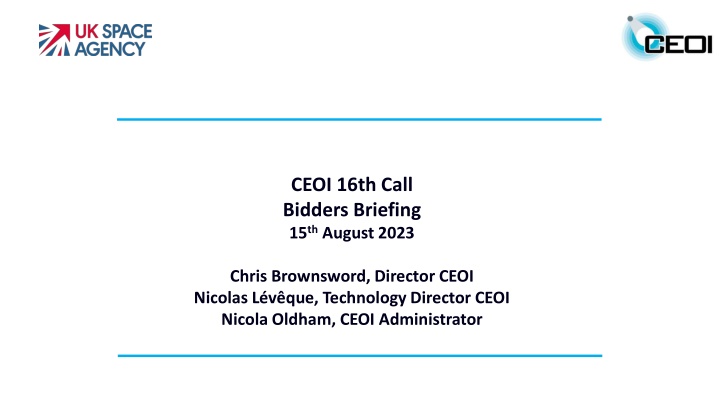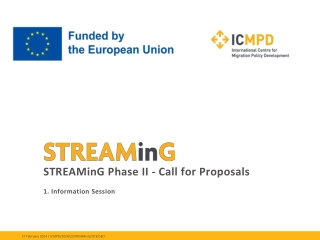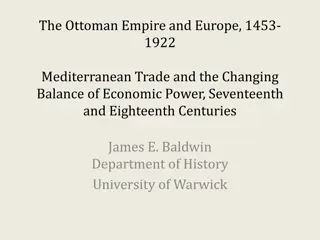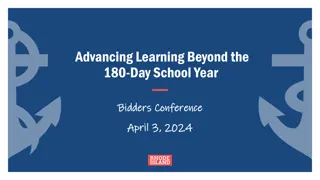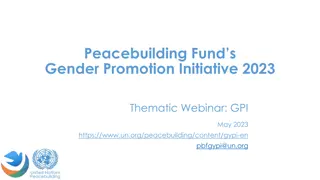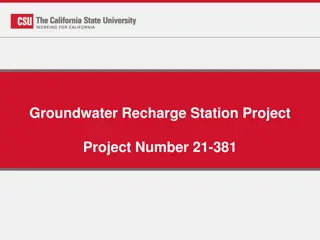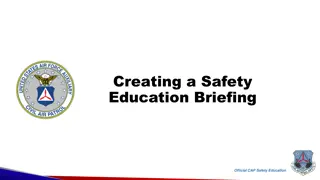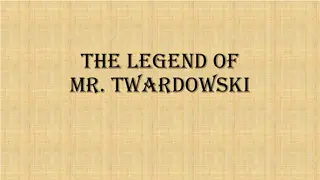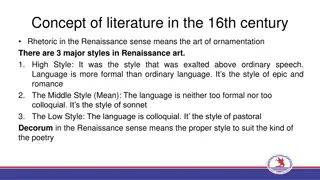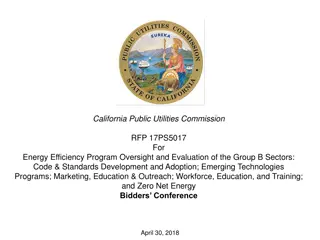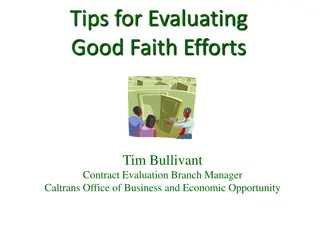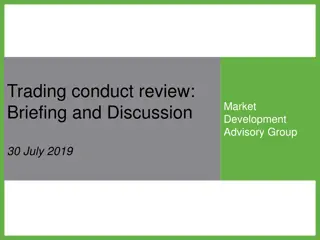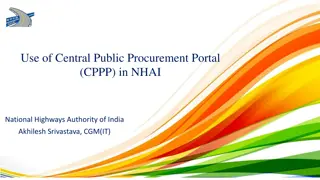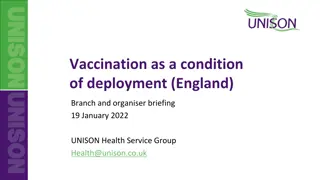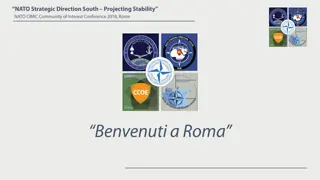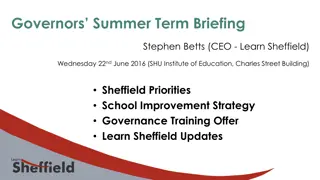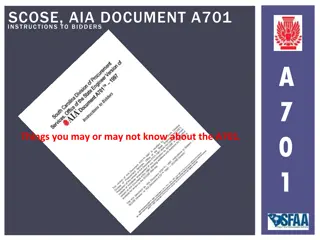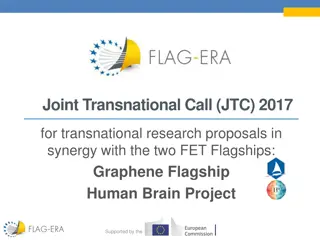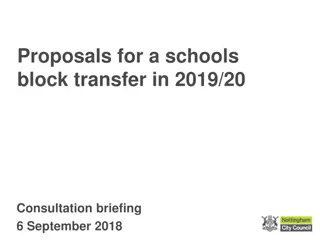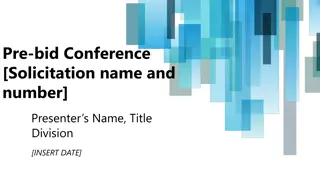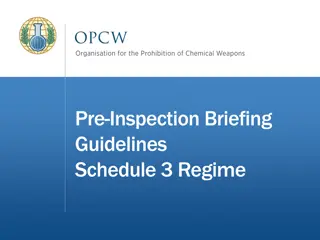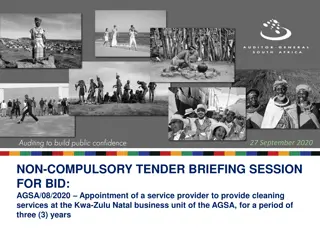CEOI 16th Call Bidders Briefing - Technology Development Proposals
This briefing session pertains to the upcoming CEOI 16th Call for EO Technology and Instrumentation Development Proposals. Learn about the project types, submission requirements, and valuable insights from past calls. Join anonymously via Microsoft Teams to explore opportunities for innovative technology development in space missions.
Download Presentation

Please find below an Image/Link to download the presentation.
The content on the website is provided AS IS for your information and personal use only. It may not be sold, licensed, or shared on other websites without obtaining consent from the author.If you encounter any issues during the download, it is possible that the publisher has removed the file from their server.
You are allowed to download the files provided on this website for personal or commercial use, subject to the condition that they are used lawfully. All files are the property of their respective owners.
The content on the website is provided AS IS for your information and personal use only. It may not be sold, licensed, or shared on other websites without obtaining consent from the author.
E N D
Presentation Transcript
CEOI 16th Call Bidders Briefing 15thAugust 2023 Chris Brownsword, Director CEOI Nicolas L v que, Technology Director CEOI Nicola Oldham, CEOI Administrator
CEOI EO16Bidders Conference House Keeping Expected duration: 10:00 11:30 (with the possibility to go on until 12:00) Participants join the telecon via Microsoft Teams and can choose to remain anonymous No list of participants will be circulated Questions can be asked in the teams chat or verbally if you do not mind being identified To ask anonymous questions please email these at any time to Nicola Oldham CEOIadmin@le.ac.uk who will ask them on your behalf Please clearly indicate which proposal section/topic they are related to Nicola will ask them on your behalf either during or after the presentation CEOI will decide if any of the issues raised warrant the publication of a formal clarification notice, which will be issued on the CEOI 16th Call website The Announcement of Opportunity (AOO) and any clarification notices take precedence over anything stated during the bidders conference. Please read the AOO and other information contained on the Call website carefully; this Bidders Conference will not present all the information available. 15-Aug-2023 2
CEOI EO16Bidders Conference House Keeping Expected duration: 10:00 11:30 (with the possibility to go on until 12:00) Participants join the telecon via Microsoft Teams and can choose to remain anonymous No list of participants will be circulated Questions can be asked in the teams chat or verbally if you do not mind being identified To ask anonymous questions please email these at any time to Nicola Oldham CEOIadmin@le.ac.uk who will ask them on your behalf Please clearly indicate which proposal section/topic they are related to Nicola will ask them on your behalf either during or after the presentation CEOI will decide if any of the issues raised warrant the publication of a formal clarification notice, which will be issued on the CEOI 16th Call website The Announcement of Opportunity (AOO) and any clarification notices take precedence over anything stated during the bidders conference. Please read the AOO and other information contained on the Call website carefully; this Bidders Conference will not present all the information available. Microphones on Mute Please 15-Aug-2023 3
Content of the presentation Summary of the Call Intention to bid Preparing your application Lessons learnt from the previous calls 15-Aug-2023 4
CEOI 16th Call Summary The Call is for EO Technology and Instrumentation Development Proposals Proposals should be for one of three CEOI project types: Flagship (from 500K to 3M) - Preparation of higher TRL technologies (see next slide) Fast-track (up to 250k, 9 months) high quality proposals that accelerate the development of innovative technologies for future scientific or commercial space missions. Pathfinder (up to 75k, 6 months) highly innovative with strong enabling potential for future space activities. Proposals should be aligned to the National Space Strategy and EO Technology Strategy There has been a significant uplift of funding from government in the period to end Q1 2025, making a total of 15 million available for this Call (with additional PV funds from bidders). Full proposals are due for submission by Monday 18th September 2023 at noon. The Call is open to industry, HEIs and other research organisations based in the UK. Collaborative proposals involving industrial and other partners of all types are strongly encouraged. Funding beyond March 2025 is not confirmed so projects not complete by this time may not receive any further funding. 15-Aug-2023 5
CEOI 16th Call Key Changes The subsidy control regulations have changed since our last call and are now defined by the Subsidy Control Act 2022, which is now in force. Due to timing constraints on the Call, we must use the Streamlined Subsidy Scheme for Research, Development and Innovation (see references) While intervention rates are similar to the past rates (but not the same), there are also restrictions on the amount of subsidy that can be given within a 3-year window. This only affects industrial and commercial bidders. We will no longer be awarding contracts for our projects. The awards will now be made as grants. However, we will continue to manage the projects in a similar way with milestones and progress reviews. The Cabinet Office Model Grant Funding Agreements (MGFA) will be used as the basis of the funding agreement between CEOI and successful bidder. We are in the process of revising some of the clauses and hope to be able to issue the MGFA on our website shortly We encourage bids under Minimal Financial Assistance (MFA) regulations in appropriate cases. (See [RD3], Chapter 7). 15-Aug-2023 6
CEOI 16th Call Flagship Proposals Subsystem TRL raising, Elegant breadboard development, Environmental testing, qualification, and access to facilities, Flight SWAP conformance, Business case development, Customer engagement, Selected studies, Instrument end-to-end software simulation, New Facilities (related to the mission concept under consideration), Field trials, Airborne demonstration - major campaign, data collection trials Cost model development for each step to spaceflight Roadmap to flight Given the diverse activities identified in the EOMCR responses, we are broadening the range of activities in scope for Flagship projects. We are unable to support funding for launch, funding for repeat build to grow constellations, or funding for full mission platform AIT. The availability of any major funding after Q1 2025 is dependent upon the government spending review, and projects will need to demonstrate strong progress and impact in the meantime for UKSA to build their business plan for submission to CSR. Project progress and impact will be evaluated by the UKSA s Monitoring and Evaluation contractor with this aim in mind. 15-Aug-2023 7
CEOI 16th Call Intention to Bid Applicants were required to notify CEOI of their Intention to Bid (ItoB) by 25th August 2023 at noon. The purpose of this is to allow CEOI to gauge the size of the response and to inform the selection of reviewers. The notification and information therein will be held in confidence (see AOO Section 9). Submitting an ItoB form does not commit the organisation to submit a bid CEOI appreciate the details in the ItoB form may change during bid evolution CEOI appreciate the designate Lead Organisation may change during bid evolution 15-Aug-2023 8
CEOI 16th Call Extra Notes Delivery of proposals The electronic submission should be sent by email to the University of Leicester CEOI administrator at CEOIadmin@le.ac.uk We will confirm by email we have received your proposal, please get in touch if you do not receive this confirmation within 48 hours. Recommendations on Project Types Definitions of project types (Feasibility Study / Industrial Research / Experimental Development) are provided in [RD5] page 28. As they attract significantly different intervention rates, please read the documents carefully. They are not specifically designed for space and will thus be somewhat ill-defined. As such, the CEOI is unable to provide a comprehensive definition, and each proposal will be assessed individually. If you are unsure about whether your proposal is encroaching on Experimental Development or Industrial Research, we recommend that you err on the side of caution, and declare it as ED. For this Call we will accept proposals that mix project categories as defined by the Subsidy Control Act 2022. However, you must clearly define the spilt such that work packages reside in one category only, and do not straddle categories. In all cases, provide the justifications for your decision. 15-Aug-2023 9
Preparing Your Application 15-Aug-2023 10
CEOI 16th Call Preparing an Application See Section 5 Guidelines For Preparing An Application All Proposal Sections defined in the table and/or section 5 of the AofO must be supplied in the proposal, unless indicated otherwise. Proposals which do not include all of the Sections (unless explicitly indicated in the Content Table as optional) may be rejected. Should any part of the application overrun the specified page limit, the Assessment Panel will only consider material up to the designated page limit (including CV) in the correct format. No additional annexes or appendices will be considered. Bidders should note that the Agency, University of Leicester or CEOI will not refund any costs associated with preparing proposals responding to the CEOI Call 11 15-Aug-2023
CEOI 16th Call Covering Letter - Notes The cover letter includes a statement of acceptance of the standard CEOI Terms and Conditions (T&Cs), defined in the Grant Funding Agreement document which will be available on the CEOI website. Bidders should note that these T&Cs will not be open to negotiation and that in submitting this statement you are accepting the T&Cs on behalf of your organisation Please ensure that authorisation is obtained from your organisation before submitting your bid. 15-Aug-2023 12
CEOI 16th Call Application form CEOI contribution to total project cost; for collaborative proposals see requirements in AOO Section 15 % have to comply with subsidy control rules (see AOO Section 15) Total FEC cost of the project = CEOI grant + partner contributions 15-Aug-2023 13
CEOI 16th Call Assessment Criteria Section Subject Mark 5.3 Technical Case 30% 5.4 Exploitation Plan and Enhancement of National Capability 20% 5.5 Project Team 10% 5.6 Project Management 20% 5.7 Project Finances 10% 5.8 Collaboration 5% 5.9 & 8 Grant Conformance 5% TOTAL 100% See the AOO for a description of the content in each Section 15-Aug-2023 14
CEOI 16th Call Assessment Criteria Technical Case Notes CEOI calls are aimed at the development of upstream EO technologies; Proposals that solely focus on downstream algorithm development, or the science to raise Science Readiness Level (SRL), are not appropriate. However if you are developing for instance sensor inversion models, then that would be a suitable piece of work as long as it is supporting a broader hardware technology development programme as the main activity in the proposal. Development of on-board processing is applicable, but must have a direct impact on the effectiveness of the EO instrument/sensor. In contrast, the development of downstream applications will not be supported by the CEOI it is something more appropriate to other UK Space Agency and UK Research and Innovation funding routes. 15-Aug-2023 15
CEOI 16th Call Assessment Criteria Project Finances Notes Full Economic Costs Academic Partners and Government institutions will be funded at no more than 80% of Full Economic Cost (FEC). See AOO reference [RD7] for further information on FEC. In-kind contributions a good way to look at this is to ask yourself questions along the lines of: Has this a definable monetary value? Can I account for this contribution in a way an auditor would recognise? Can I show it was required to deliver the project? Is its contribution to the project commensurate with the value declared? Will it be provided during the project timescale For equipment purchases; residual value (or re-sale value) at the end of the project needs to be taken off the purchase price 15-Aug-2023 16
CEOI 16th Call Assessment Criteria Allowable costs - Notes Equipment purchases CEOI Grants arising from this call are intended to fund a specific programme of work and should not the used for the procurement of equipment, unless they can be shown to be necessary for a specific project. If equipment is funded then CEOI has an expectation that equipment purchased for instrument development would normally be funded at no more than 50% However if your organisation has limited capability to fund the equipment procurement you could request a higher % funding, but this should be fully explained in your proposal You should also note that this request would be referred to the UKSA, whose policy is to fund at no more than 80% Airborne trials Flight trials arranged as an external service, procured through a commercial sub-contract, would be expected to be funded at the intervention rate of the partner procuring the service. 15-Aug-2023 17
CEOI 16th Call Assessment Criteria Collaboration - Notes For Flagship & Fast-Track proposals, preference will be given to those involving collaboration between partners Collaboration also attracts beneficial intervention rates. For this reason it is important to understand what collaboration entails: Partners are defined as entities/organisations which share and/or retain the Intellectual Property generated by them in the project. In contrast, Suppliers and Consultants supply goods and/or services to one of the Partners. It is possible that some consortia bidding for projects may need to involve non-UK entities. This is allowable in principle subject to the following conditions: The UK must lead the consortium; The UK work must represent a substantial proportion of the whole project; A non-UK based organisation cannot receive national funding any monies awarded cannot go outside the UK to a partner body. The consortium must demonstrate that the proposed non-UK capability is essential and not available in the UK. In such instances, the work can be subcontracted out (the subcontractor cannot be a partner to the project). 15-Aug-2023 18
Lessons Learnt from Previous CEOI Calls 15-Aug-2023 19
Lessons Learned from Previous CEOI Projects Technical problems Unforeseen technical difficulties - things harder than expected Manufacturing delays / accidents / component failure Under-estimation of initial technology maturity Quality of out-sourced work poor and slow Resources People: Internal reallocation post-award, resignation, slow recruitment processes Facilities: Prioritisation, scheduling conflict, failures Procurement: Took longer than expected, relying on a single specialist UK supplier (impacting time & cost) Project management Poor control of scope / control of partners / no clear identification of project goals Lack of cohesion of team Poor leadership /poor decision making Limited contingency in baseline plan Contracting; Partner contracting delays, difficulty in flowing down Ts & Cs External factors Loss of key people Market redirection: Changing project exploitation route requiring work/schedule re-planning Business Prioritisation: Pressure within organisations to prioritise other work perception that part-funded work is of lower priority than commercial/academic activities Dependency on completion of other projects Dependency on time-critical contributions from unfunded collaborators 15-Aug-2023 20
Lessons Learned from Previous CEOI Projects Ways to avoid Better contingency / mitigation planning: Being more pragmatic at bid stage on what is achievable in allocated time Better assessment of project delivery risks and possible mitigation action Inclusion of contingency in baseline delivery plan (timescales) Earlier procurement of long lead items Are academic leads thinking of these projects in more commercial terms Tighter Project Management Use of experienced PM s some academic teams successfully sub-contract PM role from outside Frequent team meeting drumbeat weekly at critical times Avoidance of dual-hatted PMs either technical delivery or management, not both (n/a to Pathfinder Projects) Preference for industrial lead on larger projects Evidenced through provision of Project Management Plans (for larger projects only) 15-Aug-2023 21
Common Proposal Shortfalls Assumption of pre-knowledge on the background to the technology Cannot assume that the reviewers are aware of previous projects Failure to show how this development step fits into a larger story and how it could end in a flight opportunity; Generic, generalised risks, without much thought to impact or mitigation Poor-quality Gantts A few blocks stuck end to end is not a good or informative Gantt chart. Unreadable pictures of very complex Gantts Using non-grant receiving partners could be considered a delivery risk Show support by letters of commitment You can submit or be a Partner in multiple proposals But the assessors may question if you have the resources to deliver all Staff resources may appear unrealistic: Reliance on a yet to be recruited person, and/or giving e.g. 80% of the hours to an unspecified RA Unrealistic number of hours assigned to a senior technical specialist Simplistic business plan e.g. global market is 4B; we will win 1%, hence this is a multi-million ROI Poor rework of a previously submitted proposal that does not meet the criteria Poor quality and/or no review of bid documents 15-Aug-2023 22
Contact Points If you have any questions during the bid phase you are welcome to contact members of the CEOI team for clarification. These will be conducted in confidence. The Points of Contact are: Nicolas L v que; nicolas.leveque@airbus.com Chris Brownsword; cbrownsword@qinetiq.com For contracts & administration, Nicola Oldham CEOIadmin@le.ac.uk Note: the CEOI are not part of the proposal evaluation team. 15-Aug-2023 23
